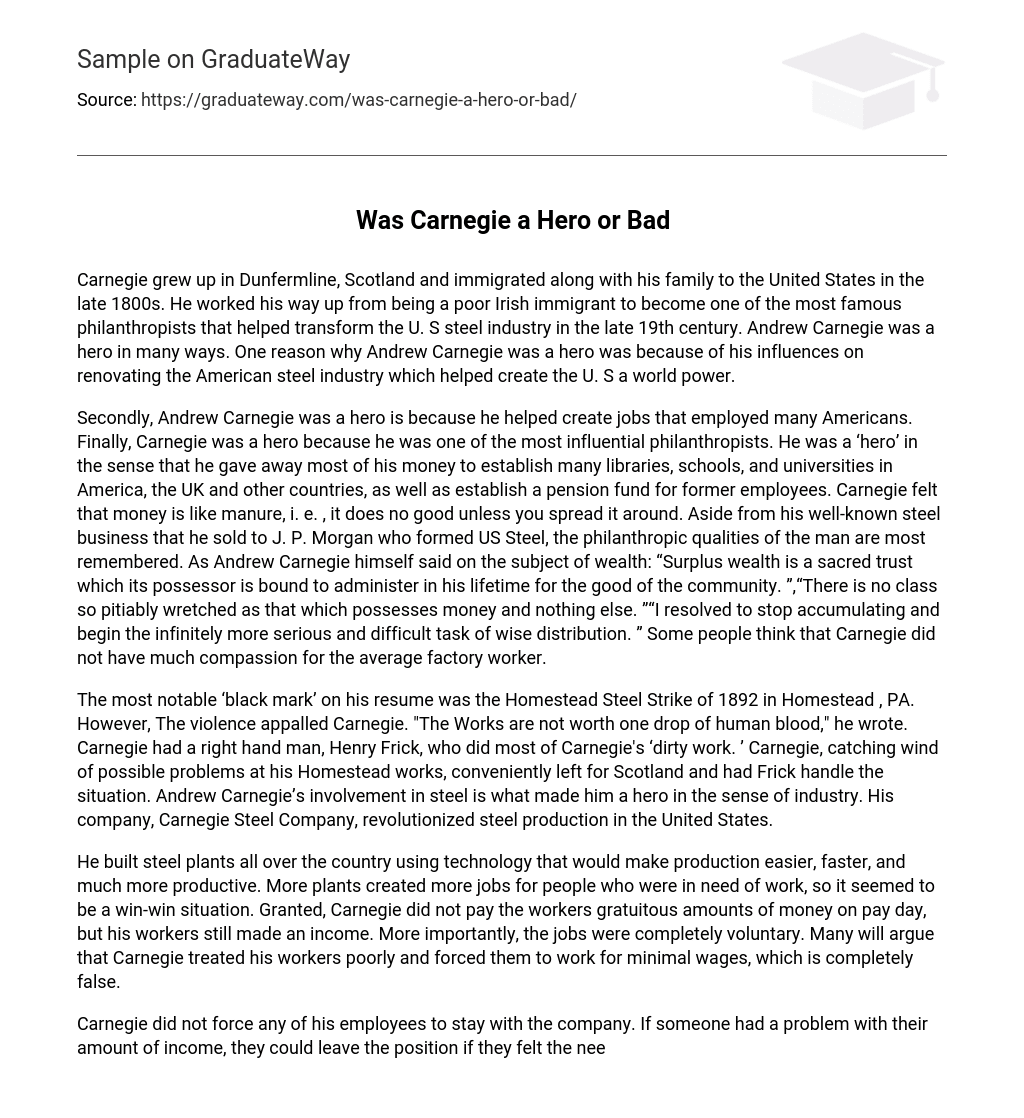Andrew Carnegie, who was born in Dunfermline, Scotland, immigrated to the United States with his family. Despite starting as a poor Irish immigrant, he became a renowned philanthropist and played a significant role in developing the U.S steel industry during the late 1800s. Andrew Carnegie can be seen as a hero for his contributions to revitalizing the American steel sector and helping elevate the nation’s global power.
Additionally, Andrew Carnegie’s heroism manifested in his contribution to job creation, benefiting numerous Americans. Furthermore, Carnegie’s status as a hero stems from his significant role as a philanthropist. Notably, he generously donated the majority of his wealth to establish libraries, schools, and universities in America, the UK, and other nations. Moreover, he founded a pension fund for former employees. Carnegie firmly believed in the importance of spreading wealth, likening it to manure that only proves useful when distributed. Although his renowned steel business was sold to J.P. Morgan, who formed US Steel, it is his philanthropic endeavors that endure in memory. Echoing Carnegie’s views on wealth, he expressed that surplus wealth is a sacred duty for its possessor to administer in their lifetime for the betterment of the community. He also emphasized the sorry plight of those who possess money but lack anything else and resolved to cease accumulation and focus on the more arduous task of wise distribution. Despite this, some argue that Carnegie lacked compassion towards average factory workers.
The Homestead Steel Strike of 1892 in Homestead, PA was the most notable blemish on Andrew Carnegie’s resume. However, Carnegie was appalled by the violence that ensued and expressed his belief that “The Works are not worth one drop of human blood.” Carnegie relied on his right-hand man, Henry Frick, to handle most of his controversial actions. When issues arose at his Homestead works, Carnegie conveniently left for Scotland while Frick dealt with the situation. Despite this stain on his record, Carnegie’s involvement in the steel industry made him a celebrated figure. Through his company, Carnegie Steel Company, he transformed steel production in the United States.
Andrew Carnegie built steel plants throughout the United States, implementing innovative technology to enhance production efficiency and productivity. The expansion of these plants not only generated employment opportunities for those in need, but also appeared to be a mutually beneficial situation. Though Carnegie did not offer exorbitant wages to his workers, they still earned a satisfactory income, and it is essential to highlight that their involvement in these jobs was voluntary. Despite claims of mistreatment and forced labor for minimal pay, it is important to clarify that such assertions are entirely unfounded.
Carnegie did not coerce his employees into remaining with the company. If anyone had concerns about their income, they had the option to leave if they felt it necessary. The workers joined the company willingly and could depart at any time. Carnegie accumulated great wealth through his labor and dedication in the steel industry. His money was earned through years of hard work. As the founder of the Carnegie Steel Company, he frequently made large donations to organizations in need.
Andrew Carnegie, the renowned businessman, is often debated as to whether he deserves the title of a hero. This is because he gave away a staggering amount of $350,695,653. Consequently, numerous programs and buildings were established, enhancing the lives of many individuals within their respective towns. Heroes like Carnegie inspire others in their field to follow suit, often selflessly engaging in philanthropy without seeking recognition. In times of economic hardship, America craved heroes like him.





